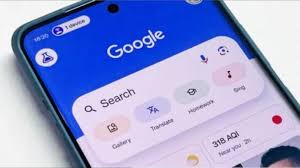In a bid to speed up a year-long transformation of its search engine that is altering how people obtain information and reducing the amount of traffic that websites receive, Google released yet another wave of artificial intelligence technology on Tuesday.
A new “AI mode” option will be made available in the US as part of the next phase, which was described at Google’s annual developers’ conference.
Because of this capability, using Google’s search engine is more like speaking with an expert who can answer queries about almost any subject.
Just two-and-a-half months after the business started testing with a small Labs division audience, AI mode is now available to everyone in the United States.
Additionally, Google is incorporating its most recent AI model, Gemini 2.5, into its search engines.
Google revealed that its Android XR glasses will be created in collaboration with Gentle Monster and Warby Parker, but it did not specify when or how much they will cost.
The glasses will go up against Ray-Ban and a comparable device that is now available from Facebook parent company Meta Platforms.
The significant importance of AI in Google search
The expansion continues a shift that Google started a year ago when it introduced “AI overviews,” or conversational summaries, which have been progressively taking the place of its conventional web link rankings at the top of its results page.
Google estimates that 1.5 billion people frequently interact with “AI overviews,” and the majority of users are now typing in lengthier, more intricate inquiries.
Before a crowded audience in an amphitheater close to Google’s Mountain View, California, headquarters, Google CEO Sundar Pichai stated,
“What all this progress means is that we are in a new phase of the AI platform shift, where decades of research are now becoming reality for people all over the world.”
In addition to acknowledging the growing competition from other AI-powered search options like ChatGPT and Perplexity, Google’s decision to make AI mode widely available after a relatively brief test period shows that the company is confident the technology won’t habitually spew false information that damages its brand’s reputation.
Will AI strengthen Google or undermine it?
After a federal judge last year ruled that Google’s search engine was an unconstitutional monopoly, the swift emergence of AI alternatives became a recurrent issue in court cases that could force the company to dissolve portions of its online empire.
Longtime Apple official Eddy Cue testified at a hearing earlier this month that Google searches conducted using the iPhone manufacturer’s Safari browser have been decreasing as more users turn to AI-powered alternatives.
Additionally, Google has pointed to the disruption brought about by AI’s ascent as one of the primary arguments for why it should only be obliged to make minimal adjustments to its search engine operations, given that technology is already altering the competitive environment.
However, it seems that Google’s increased dependence on AI is helping its search engine to continue serving as the primary gateway to the internet, which is the primary factor behind Alphabet Inc., the company’s $2 trillion market valuation.
Data provided by onelittleweb.com shows that during the year ending in March, Google received 136 billion monthly visitors, 34 times more than ChatGPT’s average of 4 billion monthly views.
When a reporter asked if the adoption of AI technology will make Google even more powerful, even Google’s AI mode admitted that the company’s search engine seemed unlikely to be affected greatly.
“Yes, it is very likely that Google’s AI mode will increase Google’s power, especially in the areas of online influence and information access,” the AI mode said.
Additionally, the feature cautions that web publishers should be worried about AI mode decreasing the amount of traffic they receive from search results.
There is still more AI in the works.
Future experiments in Google’s Labs division hint at the next generation of AI technology that will probably be made accessible to the general public.
In addition to testing the ability of an AI agent to purchase tickets and make reservations at restaurants using its Project Mariner technology, Google will also test live video searches and offer users the option to grant its AI technology access to their Gmail and other Google apps so it can gain more insight into their preferences and behaviors.
A “Deep Search” option that will utilize AI to go even further into complicated subjects and another tool that will provide graphical presentations of sports and financial data are among the other features on this summer’s test list.
With its “Ultra” membership level, which will cost $250 a month and come with 30 terabytes of storage, Google is also launching its version of a VIP access to all of its AI technologies.
That is a significant improvement over Google’s previous top-tier service, now known as “AI Pro,” which costs $20 a month and comes with two terabytes of storage.

















